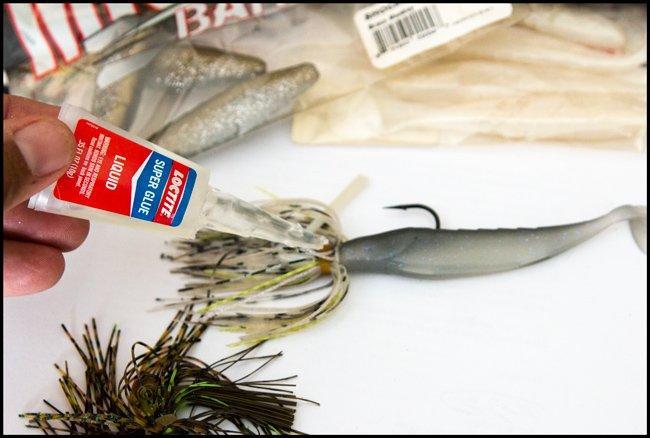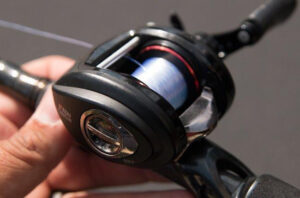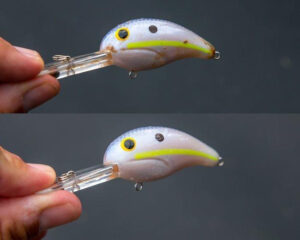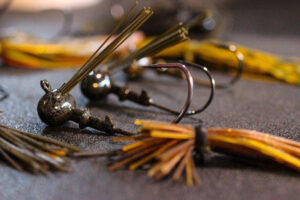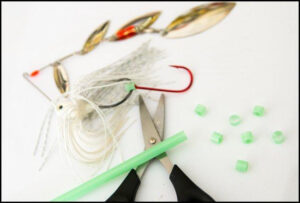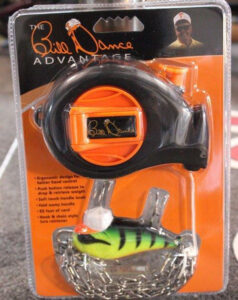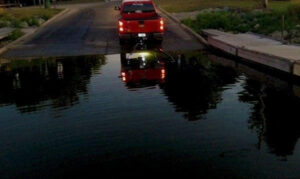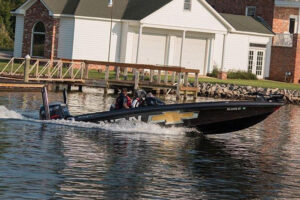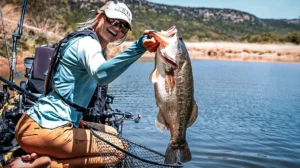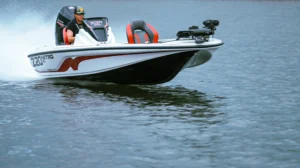Fishing for the University of Illinois, I have had the opportunity to travel around and fish some of the best bass lakes in the country. As any avid bass fisherman knows, this sport can get expensive quickly. As a collegiate angler, this sometimes means choosing between groceries for the week or lures for the weekend. This has forced me to become creative in getting every cent out of my equipment and to penny pinch while on a fishing trip.
Below are 10 things that have helped me with bass fishing on a budget:
1. Super glue is your friend
Super glue is the tool of a thousand uses. That statement holds true even in bass fishing. For instance, if I am fishing a swimbait of any kind, I like to drop a dot of glue on the jighead so that the bait stays in place. I also will use super glue on a variety of soft-plastic jig trailers for the same reasons as a swimbait. Not only does the glue help to hold the bait in place throughout the day, I find myself going through less plastics. And it can fix a hollow-bodied frog that gets torn from too many fish.
2. Backing line saves
Using old or cheaper line as backing to fill a spool halfway has saved me hundreds of dollars. An old trick to get the most use out of your braided line is to re-use it as backing line. Once the braid has run its course, simply tie the end to another empty reel and fill up the spool about halfway. The old braided backing line won’t have to be changed all year and you will get double the use out of it. Now you only have to change out 40-50 yards of your main line and one filler spool can fill up 4 to 6 reels.
3. Give old lures TLC
Throughout the course of a fishing season it is not rare to have your crankbait or jigs rust and have the hooks dull. Instead of throwing those old, beat up lures away, give them a little TLC. I use steel wool and a cheap hook file to bring my old lures back to life. The steel wool and a little elbow grease will get most any rust off your bait. While touching up your hook points with a file or sharpener can get them back to looking brand new and ready to snag any fish that slaps at your lure.
4. Make your own tackle
This winter I purchased my own skirt making kit from Tackle Warehouse along with several different styles and sizes of jigheads. These kits make it simple and fast to create your own skirt that you can add to any jig, spinnerbait, or buzzbait. Not only will you save money on jigs throughout the course of a year by making your own, you’ll also have any jighead design, weight, and color for the different conditions you may encounter while fishing.
5. Make your own trailer hooks
Another simple money saving tackle tweak I find myself using often is making my own trailer hooks. I just take a pair of scissors to any old plastic straw and cut off a couple one centimeter sections from the straw. Add your piece of straw over the eyelet of your 1/0, 2/0, or 3/0 hook and you have a perfectly good trailer hook for your spinnerbait, buzzbait, or chatterbait. The straw over the eyelet keeps your trailer hook in place while still allowing some movement on the bait which helps make your bait a little more weedless.
6. Lure retriever saves money
A good ole lure retriever saves a ton of money. When fishing around deep brush, snags are going to happen. Breaking off a couple $10 baits can get you in a foul mood. Tungsten weights, premium hooks, crankbaits and jigs are not cheap. A lure knocker will help you get your prized lures back and keep you fishing. Check out this excellent DIY lure retriever.
7. Travel in packs and book early
This year for the College B.A.S.S. Midwestern Regional in Lake of the Ozarks, our school had four boats go down a week early to pre-fish and get familiar with the lake. We talked with anglers from Nebraska and Illinois State University and ended up all staying together to help split the lodging costs. By staying with a group of twelve people and by looking for deals early, we were able to stay in a million-dollar house right on the lake for just over $100 per person for the entire week! Leaving us more money for food, gas, and tackle.
8. Don’t overlook camping
If you aren’t afraid of the elements, there is no better way to save money on a fishing trip than camping. Nowadays most campsites have a set of showers, washers and dryers somewhere on site. Either sleep in your truck or pop a tent, and you will have all the amenities you need on your fishing trip for a fraction of the cost.
9. Trailer your boat
It is no secret that running around in your bass boat burns up a lot of fuel and a lot of money. Instead on using just one ramp on a fishery, do some research to find any other ramps on a given lake. This will allow you to break the lake down into sections that you want to focus on. Then simply trailer your boat to the different ramps around the lake and spend your entire day focusing one one section at a time.
10. Half speed in practice
Something that goes hand in hand with this tip is to do what you can to conserve gas during practice. There is no reason to run your engine wide open around practice, you can’t win a tournament during a practice day. Instead keep your engine around half throttle and do your best to sip gas. You and your bank account will be happy you did when practice is over.


